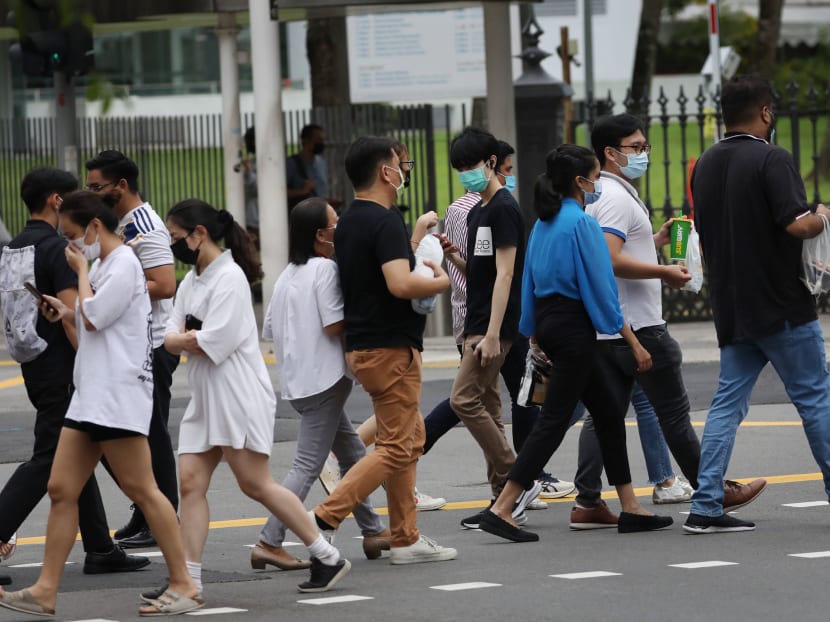Ratio of youth infected with Covid-19 up in past month; group urged not to ‘take chance’ on vaccination
SINGAPORE — Young people should not assume that they are protected from Covid-19 and thus do not require vaccinations, the director of medical services at the Ministry of Health (MOH) said.
- It is not safe for young people to hold out on vaccines, even though Covid-19 is more dangerous for older people
- This is a warning from Health Ministry’s director of medical services Kenneth Mak
- There have been cases of unvaccinated youths with no medical conditions who are in intensive care
- The proportion of new Covid-19 cases among youths have increased in the past month, he said
SINGAPORE — Young people should not assume that they are protected from Covid-19 and thus do not require vaccinations, the director of medical services at the Ministry of Health (MOH) said.
Speaking on Saturday (Nov 20) at a press conference by the national task force on Covid-19, Associate Professor Kenneth Mak said: “There are some who hold the view that because they're young, or lack any other high-risk features, (they are prepared) to take the chance of getting infected and hold out against vaccination.
“This is not a safe approach to take."
There are cases of unvaccinated youth warded in intensive care units (ICUs), even though they have no history of medical concerns.
“They remain critically ill, not assured that they will invariably make a good recovery, (and the possibility of) death still exists for some of them.
"Don't play with your life and assume that getting infected is safe for you when you are not vaccinated,” Assoc Prof Mak stressed.
The proportion of younger people being infected with Covid-19 has risen from a month ago, while the share of older people getting the diseases has either gone down or remained stable.
Around 15.6 per cent of all cases recorded on Friday were aged between 20 and 30, considered as part of the group more “socially active” in the community as they leave home on a regular basis for work or other reasons. This is up from 14.2 per cent for this group four weeks ago, he noted.
With Singapore ending its “stabilisation phase” of managing Covid-19 and loosening social measures, he warned that there will likely be more cases among younger people.
“We must not be complacent and assume that all young people infected with Covid-19 will have good outcomes,” Assoc Prof Mak added, as he urged this group to get vaccinated if they have not done so.
.embed-container { position: relative; padding-bottom: 56.25%; height: 0; overflow: hidden; max-width: 100%; } .embed-container iframe, .embed-container object, .embed-container embed { position: absolute; top: 0; left: 0; width: 100%; height: 100%; }INFECTIONS AMONG CHILDREN
For people aged 12 to 20 — namely, the school-going population — the proportion of those infected has remained stable at between 4 to 5 per cent in the past month, a testament to the measures taken in schools to limit transmissions, Assoc Prof said.
However, among children aged below 12, who are still not eligible for vaccination against Covid-19, he said that there was a slowly rising trend of infections among this group.
Young children in this group form about 11.2 per cent of all infected cases recorded on Friday, significantly higher than 6.7 per cent a month ago.
“These children remain vulnerable because they are not yet eligible for vaccination to protect them from infection, and it's generally harder to get them to comply with… mask wearing and safe distancing measures,” he said.
Although many of the children have mild infections, there is a small number who require care in paediatric ICU for severe infection or for complications due to Covid-19.
Assoc Prof Mak said that the authorities are working on extending the national vaccination programme to cover children aged between five and 12. Regulatory approvals for the Pfizer-BioNTech vaccines are still in the works.
“We will soon have robust real-world data on the safety profile of the vaccine in children, which will provide us with greater confidence that the vaccines are safe for children less than 12 years of age in protecting them against Covid-19,” he said, noting that the United States has already begun vaccinating young children and more than 2.6 million children have already gotten their first dose.
The KK Women’s and Children’s Hospital here is also studying how to vaccinate young children, he added.
The roll-out of vaccinations for this age group in Singapore could occur sometime in January next year, Assoc Prof Mak said.









